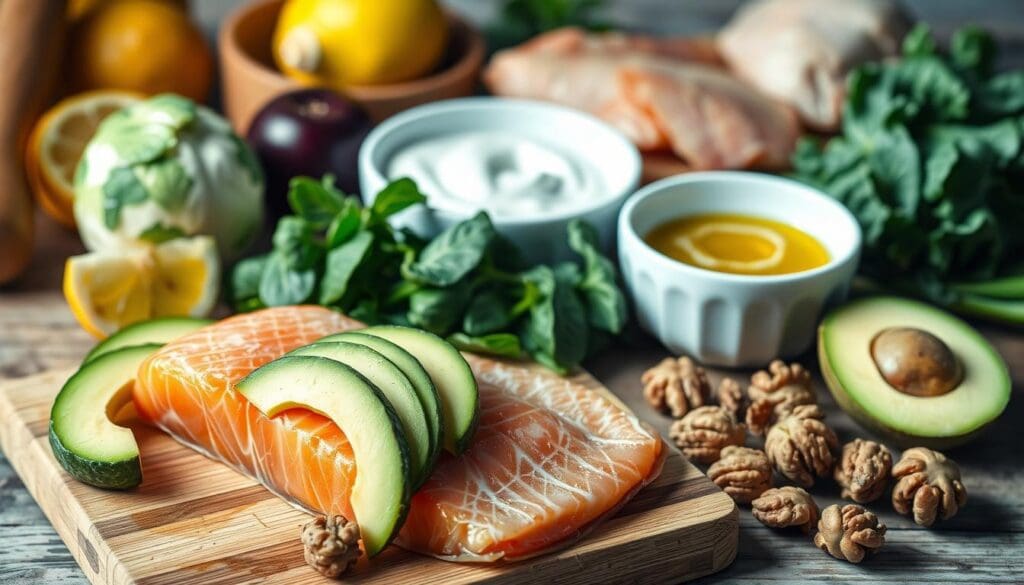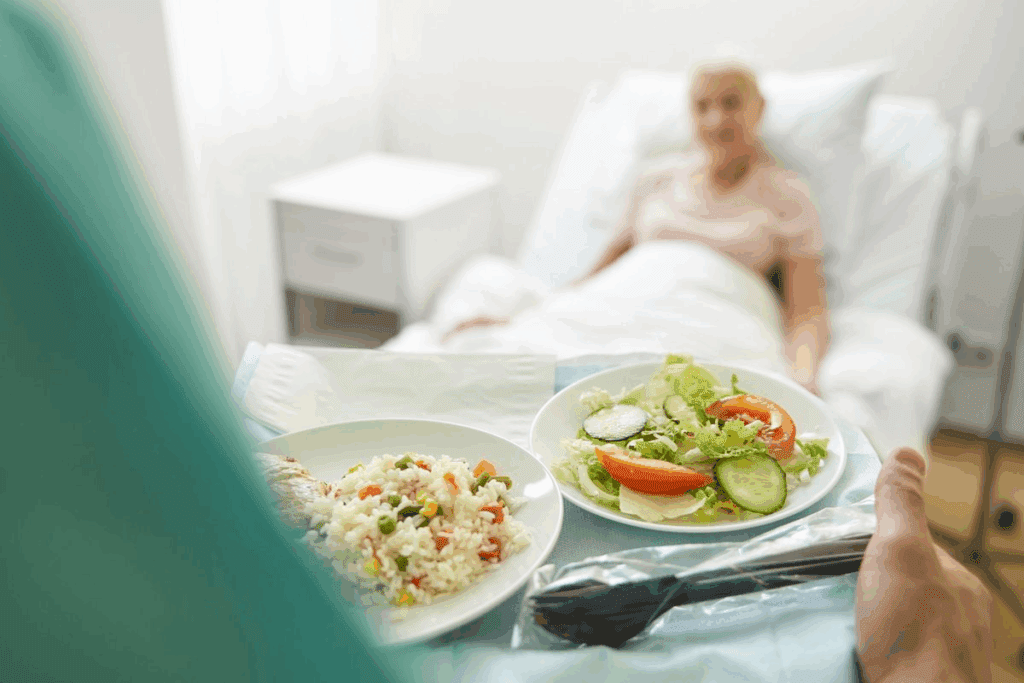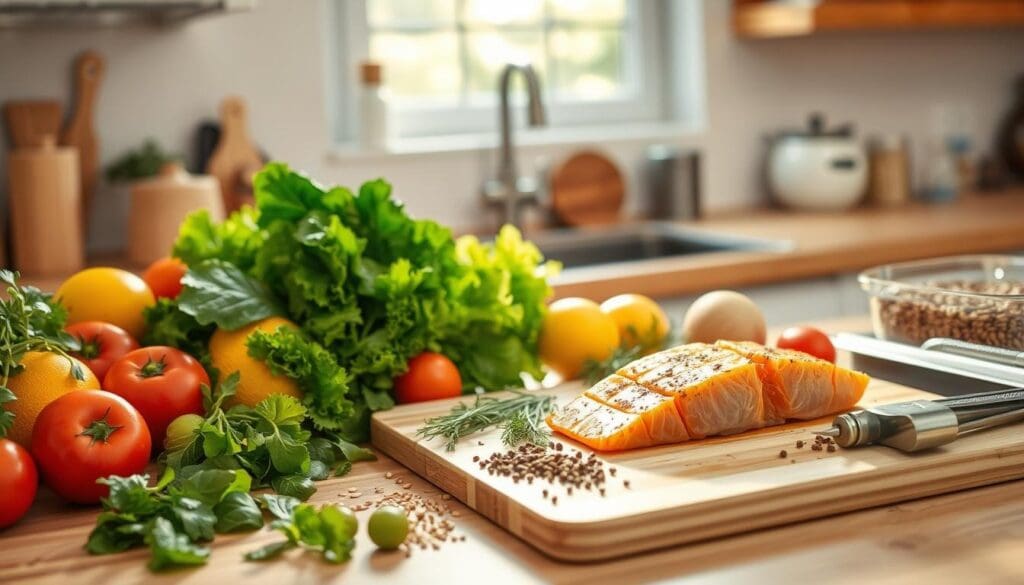Last Updated on November 26, 2025 by Bilal Hasdemir

Gallbladder problems like gallstones and cholecystitis can be linked to what we eat. The gallbladder helps with fat digestion by storing and releasing bile. But, some foods can strain it too much, leading to gallstones, inflammation, and pain.
At Liv Hospital, we know how key a healthy gallbladder diet is. We give you reliable, patient-focused nutrition tips for the best diet for gallbladder issues. By steering clear of certain foods and choosing healthier options, you can help your gallbladder work better and improve your health overall.

It’s key to know how diet affects gallbladder health to manage issues well. The gallbladder is a small organ under the liver, important for digestion. It stores bile, a liver-made fluid that breaks down fats for the body to absorb.
The gallbladder stores and concentrates bile, releasing it into the small intestine with fatty foods. This is essential for digesting fats and vitamins. A healthy gallbladder ensures bile is released correctly. But, problems can cause health issues.
“The gallbladder is sensitive, and diet can affect it,” a gastroenterology expert notes. This shows why diet matters for gallbladder health.
Gallbladder issues include gallstones, inflammation, dysfunction, and infection. Symptoms are severe abdominal pain after fatty meals, nausea, and vomiting. Spotting these symptoms early helps get medical help quickly.
Common problems are:
Knowing these conditions and symptoms helps people choose diets to manage gallbladder issues.

The food we eat is key to keeping our gallbladder healthy. Eating foods rich in good nutrients helps our gallbladder work well. But, eating too much unhealthy fat and processed foods can harm it.
The gallbladder holds bile from the liver, which helps break down fats. When we eat fatty foods, the gallbladder releases bile to help digest fats. A diet too rich in fat can stress the gallbladder, possibly causing problems or gallstones.
Healthy diets avoid saturated fats and limit processed foods. Eating too much unhealthy fat and sugar raises the risk of gallbladder disease. Knowing how different fats affect our gallbladder is important.
| Type of Fat | Examples | Impact on Gallbladder |
| Saturated Fats | Butter, lard, fatty meats | Increases risk of gallstones |
| Trans Fats | Processed snacks, fried foods | Contributes to gallbladder dysfunction |
| Unsaturated Fats | Olive oil, nuts, avocados | Supports healthy gallbladder function |
Poor diet choices can lead to gallbladder problems. Diets full of processed foods, sugar, and unhealthy fats can cause obesity and insulin resistance. Both are risk factors for gallbladder disease.
A diet lacking in essential nutrients can also harm the gallbladder. For example, a low-fiber diet can cause constipation. This can put extra pressure on the gallbladder and cause problems.
Making smart food choices can lower the risk of gallbladder issues. It’s important to eat a balanced diet with lots of fruits, vegetables, whole grains, and lean proteins.
Managing gallbladder issues starts with a smart diet. Knowing which foods to avoid is key. The gallbladder helps with digestion, and some foods can cause pain. By limiting these foods, you can manage symptoms better and prevent flare-ups.
Fried foods and fast food are bad for gallbladder issues. They are high in fat, which can make the gallbladder contract and cause pain. Avoiding fried foods and fast food can help prevent gallbladder pain. Stay away from french fries, fried chicken, and doughnuts.
Fatty cuts of meat can also trigger gallbladder pain. Meats like beef, pork, and lamb are high in fat. Choosing leaner cuts or other protein sources can help ease symptoms.
Full-fat dairy products, like cheese and whole milk, are high in fat. They can make the gallbladder contract. Switching to low-fat or fat-free options can help manage symptoms.
Processed meats, like sausages and hot dogs, are not good for the gallbladder. They are high in fat and contain harmful additives.
“A diet rich in processed meats can increase the risk of gallbladder disease,”
making whole, unprocessed foods a better choice.
By avoiding these foods and making smart food choices, you can manage your gallbladder issues. This can improve your overall quality of life.
Knowing which foods can cause gallbladder pain is key to managing it well. We’ve talked about some foods to avoid. But, there are more foods that can make gallbladder problems worse.
Spicy foods can upset your stomach and cause gallbladder pain. The capsaicin in these foods can speed up digestion. But, it might also make people with gallbladder issues feel uncomfortable.
Caffeine and alcohol can make the gallbladder work harder, leading to pain. Caffeine can make the gallbladder contract. Alcohol can irritate the gallbladder and liver, making problems worse.
Some artificial sweeteners and food additives are hard for the body to digest. They can cause gallbladder pain. Always check food labels to spot these additives.
Vegetables like beans, cabbage, and broccoli can make gas. This can be uncomfortable. People with gallbladder issues might need to eat less of these veggies to feel better.
| Food Category | Potential Effect on Gallbladder | Recommendation |
| Spicy Foods | Irritate digestive system, trigger pain | Limit or avoid |
| Caffeine & Alcohol | Stimulate gallbladder, cause pain | Consume in moderation |
| Artificial Sweeteners | Difficult to process, trigger pain | Read labels, limit intake |
| Gas-Producing Vegetables | Cause gas, discomfort | Limit consumption if necessary |
By watching out for these foods, you can manage your gallbladder pain better. This can help improve your gallbladder health.
The best diet for gallbladder issues focuses on a few key principles. These principles can greatly improve your life quality. We will dive into these principles to see how diet changes can help manage gallbladder health.
A low-fat diet is often suggested for those with gallbladder problems. It means eating less fatty foods. These foods can make gallbladder contractions worse and increase symptoms.
Foods high in fat include fried foods, fatty meats, and full-fat dairy. Cutting down on these can ease gallbladder pain.
Key Foods to Limit:
Eating high-fiber foods is important for gallbladder health. Fiber lowers the risk of gallstones and improves digestion. Foods high in fiber are fruits, vegetables, whole grains, and legumes.
More fiber helps keep bowel movements regular and prevents constipation. This is good for gallbladder health.
| High-Fiber Foods | Fiber Content per Serving |
| Avocado | 10 grams |
| Broccoli | 5 grams |
| Quinoa | 5 grams |
Drinking enough water is key for gallbladder health. Water helps prevent gallstones by keeping bile thin. Aim to drink at least 8 cups (64 ounces) of water daily.
By following these core principles, you can improve your gallbladder health. This can also lower the risk of future problems.
We suggest focusing on certain food groups that are good for your gallbladder. Adding these foods to your daily meals can help ease gallbladder symptoms.
Leafy greens like spinach and kale are full of antioxidants and fiber. They’re great for a gallbladder-friendly diet. Cruciferous veggies like broccoli and cauliflower also support liver and gallbladder health. You can cook them in many ways, like steaming, roasting, or sautéing.
Fruits like oranges and grapefruits are good for preventing gallstones because they’re high in vitamin C. Berries like blueberries and strawberries are packed with antioxidants. They help fight oxidative stress. Enjoy these fruits raw or blended in smoothies.
Whole grains such as brown rice and quinoa are full of fiber. This helps manage cholesterol and supports gallbladder health. Legumes, like lentils and chickpeas, are also high in fiber and protein. Adding them to your meals can boost digestive health.
Opting for lean proteins like poultry and fish can ease gallbladder pressure. For plant-based options, tofu and tempeh are great. They offer important nutrients without being hard on the gallbladder.
By adding these gallbladder-friendly foods to your diet, you can actively manage gallbladder problems. This can also improve your overall health.
Knowing what to eat during a gallbladder attack is important. It helps reduce pain and discomfort. The goal is to ease the strain on your gallbladder and digestive system. Making smart food choices can help with symptoms.
When you have a gallbladder attack, your digestive system needs a break. Fast for a few hours to let your gallbladder rest. Once the pain goes away, start with bland foods.
It’s also important to stay hydrated by drinking lots of water. Avoid caffeinated and carbonated drinks as they can upset your stomach.
When you’re ready to eat, choose bland, easy-to-digest foods. These include:
Stay away from fatty, greasy, or spicy foods. They can make pain worse by causing your gallbladder to contract more.
| Foods to Eat | Foods to Avoid |
| Plain toast | Fatty foods |
| Crackers | Greasy foods |
| Plain rice | Spicy foods |
| Bananas | Caffeine |
| Applesauce | Carbonated drinks |
By sticking to these dietary tips during a gallbladder attack, you can manage your symptoms better. If you have frequent or severe attacks, see a doctor for help.
Planning meals is key for gallbladder health and avoiding painful attacks. Making smart food choices can ease symptoms and boost life quality. We’ll look at how to make a meal plan good for the gallbladder, including a daily example and tips on portion sizes.
A good meal plan helps avoid foods that can trigger gallbladder issues. Here’s a daily plan example:
This plan includes low-fat, high-fiber foods that are easy on the gallbladder. Drinking lots of water is also important.
Portion control is critical for gallbladder health. Big meals can hurt the gallbladder, causing pain. It’s better to eat smaller meals often.
A healthcare expert says, “Eating smaller meals reduces gallbladder strain, lowering attack risk.” This method helps manage symptoms and improves digestion.
Switching to a diet that helps your gallbladder is key to managing gallbladder problems. Changing your diet can be tough, but with a slow and smart approach, you can do it well.
When starting a new diet, it’s important to make small changes. This lets your body get used to it. Start by cutting down on foods that can hurt your gallbladder. Slowly add gallbladder-friendly foods to your meals for a balanced diet.
Begin by swapping high-fat foods for lower-fat ones. Add more fruits, veggies, and whole grains to your diet. These foods are gentle on your gallbladder and full of good nutrients.
“The key to a successful dietary transition is patience and persistence. By making small, incremental changes, individuals can significantly improve their gallbladder health.”
Learning to read food labels is key when changing your diet. It’s important to know what’s in the foods you eat. Look for foods that are low in fat, added sugars, and sodium.
| Nutrient | Recommended Daily Intake | High-Risk Foods |
| Total Fat | 20-35% of daily calories | Fried foods, fatty meats |
| Added Sugars | Less than 10% of daily calories | Sugary drinks, baked goods |
| Sodium | Less than 2,300 mg | Processed meats, canned soups |
By paying attention to these nutrients and choosing wisely, you can manage your gallbladder health better.
Remember, it’s not just about avoiding bad foods. It’s about adopting a healthier lifestyle. With time, these changes will become easy, helping you feel better overall.
Living without a gallbladder means you need to watch what you eat. This is to avoid discomfort and make sure you get all the nutrients you need. After surgery, your body can’t digest fats as well, so you’ll need to change your diet.
Right after surgery, it’s important to eat foods that are easy on your stomach. Start with a low-fat diet to avoid digestive problems. Stay away from fatty foods, fried foods, and high-fat dairy.
Drinking lots of water is also key. Avoid caffeinated and carbonated drinks, as they can upset your stomach.
Long-term, managing your diet without a gallbladder means making lasting changes. Focus on a balanced diet full of fiber, vitamins, and minerals. Choose foods that are easy to digest to avoid issues like diarrhea and fatty stools.
Some important tips include:
Eating smaller meals more often can also help. Try to avoid foods high in fat and sugar, as they’re hard for your body to digest without a gallbladder.
By following these dietary tips after gallbladder removal, you can greatly improve your life. You’ll also reduce the chance of digestive problems.
Diet is key to gallbladder health, but sometimes you need more than just food changes. Knowing when to get help is important for handling gallbladder problems well.
Some symptoms mean you should see a doctor. These include:
If you have these symptoms, see a doctor right away. Quick diagnosis and treatment are key to managing gallbladder problems.
Healthcare providers are essential for managing gallbladder health. They offer dietary advice and treatments. When working with your healthcare provider, remember:
By teaming up with your healthcare provider and knowing when to seek medical help, you can manage your gallbladder health. This improves your overall health and well-being.
Creating a sustainable diet is key for long-term gallbladder health. A balanced diet with gallbladder-friendly foods can ease symptoms and stop flare-ups. We’ve looked at the main parts of a gallbladder-friendly diet, like eating less fat, more fiber, and staying hydrated.
It’s important to avoid foods that can trigger problems, like fried foods, fatty meats, and processed meats. Instead, add leafy greens, vitamin C-rich fruits, whole grains, and lean proteins to your meals. Planning your meals and controlling portions can also help manage symptoms and prevent issues.
Slowly changing your diet and being careful about what you eat can help you build a healthy eating plan. We suggest working with healthcare providers to create a diet plan that fits your specific needs.
Following a gallbladder-friendly diet can lower the chance of gallbladder problems and improve your life quality. We’re dedicated to helping you reach your health goals with the right diet choices and support.
We suggest adding foods like leafy greens and fruits rich in vitamin C to your diet. Whole grains and lean proteins are also good. These foods help your gallbladder work better and reduce pain.
Stay away from fried foods and fatty meats if you have gallbladder problems. Full-fat dairy and processed meats can also cause issues. Spicy foods, caffeine, and alcohol can make symptoms worse.
Fat is important for gallbladder function because it makes bile release. But too much fat can hurt your gallbladder, causing pain.
Limiting fat in your diet can help your gallbladder. Choose lean proteins and low-fat dairy. Avoid fried foods and fatty meats.
To manage pain, eat bland foods like plain toast and crackers. Avoid foods that trigger pain. Drinking plenty of water also helps.
When planning meals, focus on portion control and eating frequency. Choose foods that are good for your gallbladder. A daily meal plan can guide your choices.
Start by making small changes to your diet. Read food labels and add more fruits, veggies, and whole grains. This helps your gallbladder.
After surgery, follow a low-fat diet. Also, manage fat-soluble vitamins and bile salts long-term. This helps your body adjust.
If you have severe pain, fever, or jaundice, get medical help. Working with doctors can help you manage your gallbladder health better.
You don’t have to give up your favorite foods completely. Just avoid foods that can make symptoms worse. Enjoy them in moderation, but not too fatty or spicy.
Drinking plenty of water is key for gallbladder health. It helps thin out bile and prevents stones. Stay hydrated all day to support your gallbladder.
Pietrangelo, A. (2024). Managing weight loss after gallbladder removal. Medical News Today. Retrieved from https://www.medicalnewstoday.com/articles/317659
Subscribe to our e-newsletter to stay informed about the latest innovations in the world of health and exclusive offers!